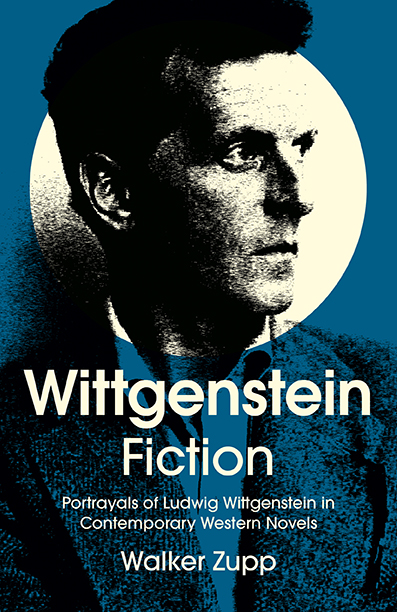Wittgenstein Fiction
Synthesizes literature and history, with regards to Wittgenstein’s life and philosophy

Synthesizes literature and history, with regards to Wittgenstein’s life and philosophy
Synthesizes literature and history, with regards to Wittgenstein’s life and philosophy
European (general), Language, Modern (general)
In this new book, Walker Zupp demonstrates the need to reevaluate the connection between Ludwig Wittgenstein’s philosophy and the extraordinary life that he led, and how the best way to do this, ironically, is by examining novels whose central characters were inspired by Ludwig Wittgenstein’s persona.
In Wittgenstein Fiction, Zupp offers comprehensive biographical cross-sections of novels by Thomas Bernhard, Bruce Duffy and Lars Iyer in an attempt to define the genre of Wittgenstein Fiction for the very first time. He argues that Wittgenstein Fiction satirizes the empirical world and the contemporary university, and that authors who work in this genre have to re-create themselves, to some extent, in the form of their fictional Wittgenstein characters, so that fictional biographies of Wittgenstein become strange autobiographies of the authors themselves.
Click on the circles below to see more reviews
Why do writers keep re-imagining the life of Ludwig Wittgenstein? And why do their novels get better the further they stray from biographical fact? Walker Zupp’s original study of what he calls ‘Wittgenstein fiction’ takes up these questions in fascinating detail. With light-hearted precision, Zupp gauges contemporary fiction’s use—and often misuse—of one of the twentieth century’s most beguiling thinkers. ~ Dr. Jason Baskin
While reading Wittgenstein Fiction by Walker Zupp, a notion from Wittgenstein’s Blue and Brown Books (published after the author’s death) returned to me with the timing of a punchline and the insistence of a headache. “It would be wrong to say that when someone points to the sun with his hand, he is pointing both to the sun and himself because it is he who points; on the other hand, he may by pointing attract attention both to the sun and to himself.” Zupp’s book is one of those wonderful creations – wonderful in both senses of the word – that prompts the reader to consider how it might have come about in the first place. The author notes that “there is a clear narrative of contemporary Western novels which uses Wittgenstein either as the main character, or the basis for the main character, and which demonstrates, perhaps, that Wittgenstein’s life had a bigger impact on literature than we originally believed to be the case.” By exploring these novels, and by conducting a rigorous review of supplementary material, Zupp executes something wholly original. He compares the fiction authors’ propositions with what is known about the Wittgenstein who lived and breathed in society. He also (as it were) points at the sun. As Zupp explains: “the novels that I am going to analyse have the potential to change the way we understand Ludwig Wittgenstein” – a statement that modestly omits the substantial range of ideas that Zupp himself provides, with confidence, erudition and ambition, throughout the monograph. In fact, I believe that Wittgenstein Fiction achieves the marvellous: it is a short, tight text during the reading of which the reader feels nourished and that he’s got his money’s worth. It has spurred this reader on to revisit some of Wittgenstein’s own contributions. Wittgenstein might have longed to fathom the foundations of logic, but we can only speculate on what he might have made of being a character in someone else’s fiction… and not only once! Bravo, Walker Zupp! Wittgenstein Fiction is work of the first water. Zupp’s stance is academically secure and he times his punchlines and insists with acuity and skill. He makes the reader think and rethink. ~ Dr. David Mathew, author of Psychic River and Fragile Learning
Walker Zupp wittily examines the strange presence of Wittgenstein, or rather different versions of Wittgenstein, sometimes with marked differences from the ‘empirical’ philosopher. He refracts these imagined Wittgensteins through the lenses of architecture, Judaism and the university to show how his legacy extends beyond academic philosophy to a curious afterlife in highbrow fiction. Zupp’s book leaves us with the question of why Wittgenstein should have had this treatment and not other equally famous or notorious philosophers. Where is the Heidegger fiction or the Derrida fiction? ~ Professor Charlie Gere, author of World’s End and I Hate the Lake District
Focusing on the peculiar and well-populated genre of Wittgenstein Fiction, Walker Zupp explores the novel’s capacity to perform its own Philosophical Investigations even as it stands outside philosophy investigating its philosophers themselves. Central to the author’s many provocative insights is that - paradoxically as the Tractatus’ proposition 7 - the nearer a fictional depiction aligns with the historical record, the less room remains for novel interpretation of Wittgenstein’s life and thought. ~ Mike Sauve, author of How to Market Your Grief Blog, editor of Time & Propinquity